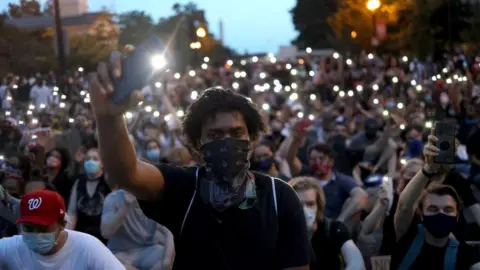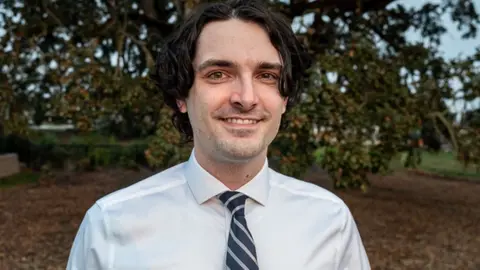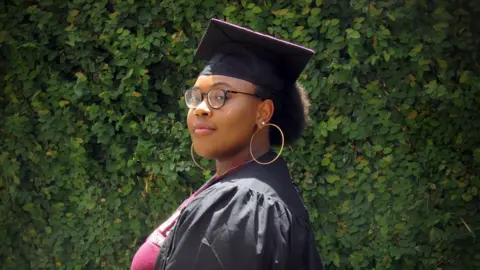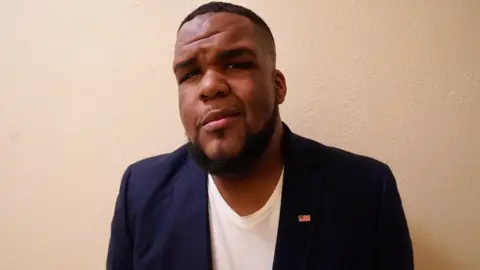US election 2020: The young people struggling in the 2020 economy
 Getty Images
Getty ImagesThe pandemic has had a disproportionate economic impact on young people. And in the US, where the crisis is colliding with a bitter presidential election, the strains are expected to leave a mark on their politics, further widening the gap with older, more conservative generations.
In January, Joshua Boyer was on the cusp of living his version of the American Dream. The 30-year-old was planning to launch a career in social work, start a family with his fiancée in a few years, and eventually buy a house.
The pandemic, he says, "changed everything".
Five months after graduating with his master's degree, he remains without a job, despite applying to some 300 openings - including positions at warehouses, restaurants and grocery stores. This month, as the financial assistance he was getting as a military veteran expired, he moved in with his fiancée's family in Oregon, giving up his Portland-area apartment.
It all feels eerily familiar to Joshua, who graduated from high school in 2008, when the world was in the midst of the global financial crisis. At the time, he entered the military to escape the desolate prospects facing him in the labour market, which he saw stalling the lives of many of his peers.
 Robert Brummitt
Robert Brummitt"Having gone through both of these recessions, it feels like more of the same," he says. "Everyone is going to understand this giant gap in my employment history right now, but that's still my biggest fear... are we going to be another lost generation?"
Scars from the Great Recession
Joshua's concerns are widely shared.
In the US, adults aged 16-29 accounted for a third of the rise in the unemployment rate between February and April, despite representing less than a quarter of the workforce.
As of June, some 28% of 16-24-year-olds were neither working nor in school, more than double pre-pandemic levels, while by July, a majority of 18-29-year-olds were living with their parents for the first time since the Great Depression.
Such setbacks, early on in a career, can have long-term consequences, with research finding that entering the workforce in a weak economy acts as a drag on wage growth and career prospects for years.
And many young adults in their 30s are still grappling with the aftershocks from the 2007 financial crisis, which ushered in a decade of stagnant wage growth, despite sharply rising housing and health costs.
By 2016, the typical 32-year-old had 34% less wealth than a 32-year old from prior generations - a gap that had widened since 2010, America's central bank reported in 2018.
"The economic prospects are fundamentally different" for younger generations, says University of Delaware political science professor Vladimir Medenica, a research consultant with the University of Chicago's GenForward Survey Project, which routinely polls young adults about finances and politics. "There's really no comparison."
'I'm always running'
Even before the pandemic, finding a good job was difficult, says A'Naiya Davis, 23, of Texas, who lived with her parents and worked in minimum wage retail positions after graduating from college in 2018.
 A'Naiya Davis
A'Naiya DavisShe finally moved out after landing a role last year as a content specialist for a website - only to lose it in June amid pandemic cuts. Though she secured another job in September, the intervening months forced her to dip into savings and postpone plans to buy a new car.
She says she feels lucky to have less than $15,000 in student debt - the average American student borrower has about $30,000 - but the traditional markers of adulthood, like buying a home or even living without a roommate, feel increasingly out of reach.
"I don't feel like we'll ever get the opportunity to catch up," she says. "I feel like I'm always running to reach that line where I'm OK, I can break even, I'm fine."
A left-leaning generation
Academic research has found that people hit by economic downturns during their formative years are more likely to favour redistributive policies and attribute success to luck rather than hard work.
In the US, such shifts have appeared in surveys of young adults that show declining approval of capitalism, stronger identification with the Democratic Party and outsize support for politicians on the left such as Social Democrat Bernie Sanders, who has made questions of economic justice central to his message.


As of August, just 23% of those between the ages of 18 and 36 said they planned to support Republican Donald Trump's re-election to the presidency, a GenForward survey found.
The generational differences in the US are influenced by many factors, including the more diverse make-up of younger adults, but "economic experiences are definitely a part of that," says Kim Parker, director of social trends research at the Pew Research Center, which reported a growing "generation gap" in politics in 2018.
"We can see in our data the struggles they're having landing a secure job and also being able to pay basic expenses," she says. "Those experiences are things they're most likely going to bring to the ballot box."
 Andrew Quist
Andrew QuistAndrew Quist, 23, who plans to vote for Democrat Joe Biden in November, has been living with his parents in Michigan and looking for a job in software engineering since graduating from college in May.
He says he's lucky to have family support to fall back on - including a part-time job at his father's business - but he's worried about those in less fortunate circumstances, especially in an era when technology is changing many industries.
"Because I have the resources that I do and the support that I do and I cannot find a job myself, it makes me very concerned for people who do not have the same," he says. "Most of the people I know... are almost sort of resigned to the fact that they straight up won't have a career."
Not everyone has lost hope.
As a first generation American, 28-year-old Fernando Acosta says he sees plenty of opportunity for people willing to invest in themselves - pointing in part to his own story, as the first in his family to go to college and his success networking his way to his current job, as a project manager in the public sector in New York.
 Fernando Acosta
Fernando Acosta"At the end of the day, it's up to the individual," he says. But Acosta, a Republican who plans to vote for Mr Trump, knows he's an outlier among his peers.
"Sometimes it gets really rough and you just want things to be resolved right away," he says. "This is why a lot of people in my generation lean left."
Youth turnout
People under the age of 40 account for more than a third of the US electorate, but they have historically voted at lower levels than older generations.
While there are questions about whether Mr Biden, who is considered relatively moderate, will bring them to the polls in high numbers, Prof Medenica says he is "cautiously optimistic" that youth turnout will be strong, pointing to signs like higher levels of voter registration.
Alicia Gallegos, 21, of New Mexico, who backed Mr Sanders in the primary and describes herself as holding "very radical" political views, says she doesn't expect Mr Biden to push for the economic changes she would like to see. But, for now, she thinks he's a better option when it comes to issues such as racial justice, immigration, gun violence and climate change.
 Alicia Gallegos
Alicia GallegosBut Alicia, who stopped going to university full-time last year after her father lost his job and works at electronics retailer Best Buy to help with the family finances, says long-term, she and others like her will demand more.
"The majority of us, we're kind of poor, and we're not white, we're people of colour and we're tired of seeing this government and this country isn't made for us, it's made for the top 1%," she says. "We realise what's happening and we want change."
